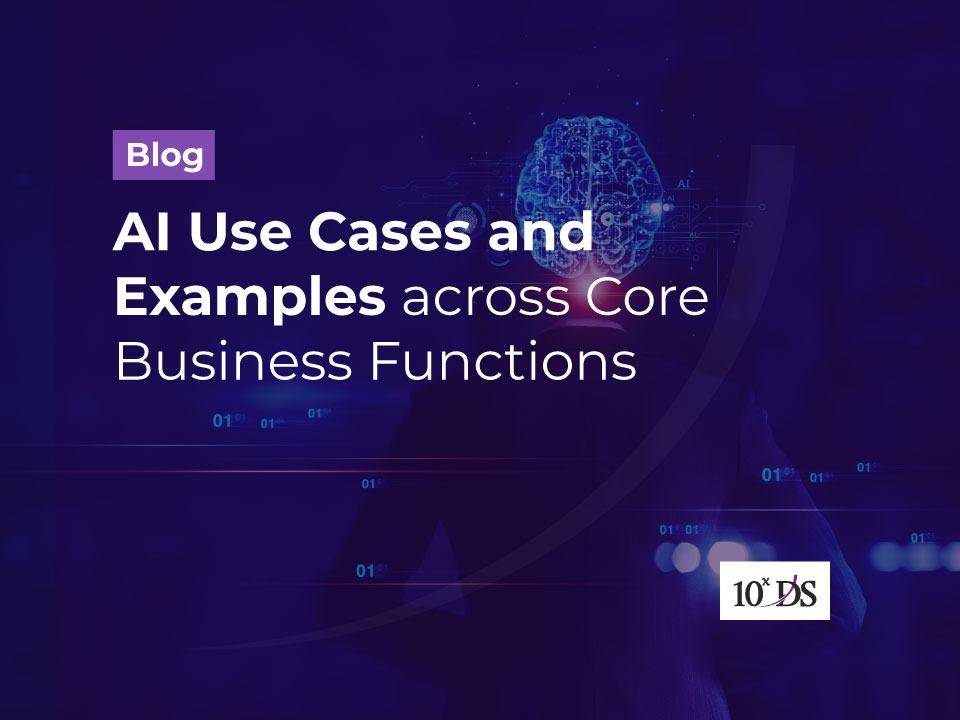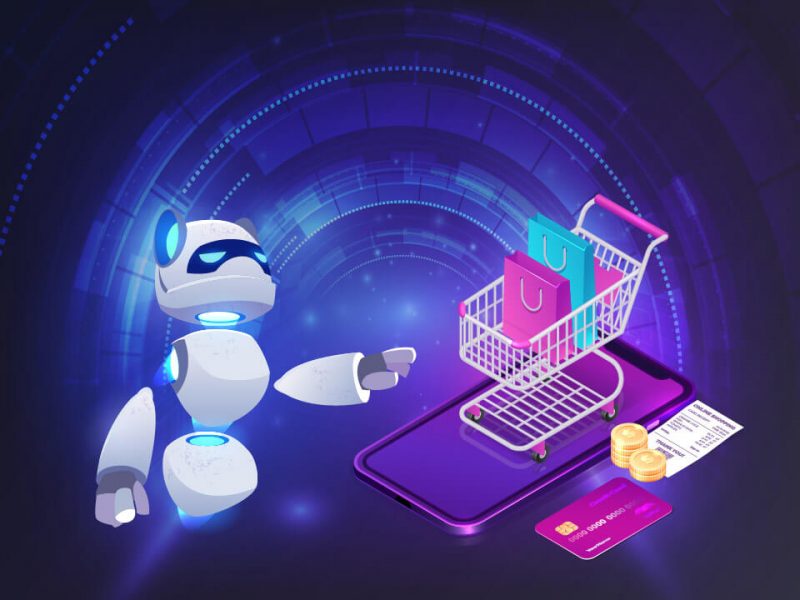
AI Use Cases and Examples across core Business Functions
There has been a steady increase in the use of artificial intelligence (AI) recently. The banking and financial sector, the healthcare sector, the automotive sector, the telecommunications sector, the industrial sector, the defence and military sector, the entertainment and media sector, the educational sector, etc. are all undergoing significant technological change.
In addition to improving workers’ productivity, it is also ushering in a new era of business. According to a 2023 McKinsey survey, 50% of companies reported using AI in at least one business function. AI’s importance is growing at an unprecedented rate because of its ability to do anything from forecast consumer behaviour to minimise data input.
It’s hardly surprising given that AI allows for quicker and more precise decision-making than ever before. This article will discuss some of the applications of AI in core business functions. Before that let’s see the role and impact of AI.
Role and Impact of AI Today
There has to be a clear understanding of what we mean by “artificial intelligence” (AI) before we can talk about its implications for companies and industries. Artificial intelligence (AI) refers to the capabilities of computers to learn, plan, and solve problems in ways that are similar to those of humans. AI is typically seen as a supplement to human intelligence and resourcefulness rather than a replacement for it. Although AI currently lacks the ability to carry out activities requiring common sense, it can process and analyse massive volumes of data at a far faster rate than the human brain. Artificial intelligence software can synthesize potential actions and show them to the user when they return.
Therefore, people may utilise AI to help them weigh the outcomes of their choices and make more informed judgments. Artificial intelligence has the potential to improve and revolutionise many different types of operations due to its capacity to learn and process enormous volumes of data. Machines will need to employ a number of different technologies in order to perceive, learn, comprehend, and act in ways that complement human skills through artificial intelligence.
Some of the most popular uses of AI today are in areas such as automation, data analytics, and natural language processing (NLP). How do these three areas work together to improve productivity? You can see how they influence many different industries below.
Because of automation, humans are no longer needed to do routine tasks. Tasks that are repetitive or prone to mistakes are taken care of, allowing workers more time for more important projects.
Data analytics: By uncovering previously unseen connections and patterns in data, businesses may get valuable insights that were previously unavailable.
Natural Language Processing (NLP) is useful because it makes it possible for search engines to perform better, chatbots to be more accommodating, and people with disabilities (such as hearing impairments) to have greater access to information. Let’s examine few AI use cases in business functions.
1. AI in Sales
Professionals in sales are re-evaluating how much emphasis should be placed on using automated systems. Inevitably, the rise of AI-powered automation will have a significant impact on business revenue. Harvard Business Review found that businesses who implement AI in their sales processes saw a 50% boost in leads, a 70% decrease in call time, and a 40%-50% decrease in costs. As the figures show, it’s very evident that AI is a viable option for business executives looking to boost profits.
Some contemporary applications of AI in Sales include the following:
Market anticipation: Its difficult, yet automatable. Sales forecasts may be automatically generated from all customer contacts and past sales performance, thanks to artificial intelligence.
Artificial intelligence (AI) helps score leads and prioritise them. As a result of using these technologies, sales teams may prioritise consumers depending on their likelihood of making a purchase. By analysing past interactions between a salesperson and a client, as well as the client’s and the salesperson’s social media profiles, an AI-powered system may assign a lead’s or opportunity’s probability of closing.
Automated chat and email support for sales staff: Chatbots are reported to boost revenue by an average of 67%. Helping to kick off the discussion with a personalised message makes it easy for customers to respond right away or return later. The use of AI algorithms to generate customised emails can also relieve sales staff of the time-consuming task of individually crafting messages for each of their clients.
2. AI in Marketing
Many businesses might already be using AI in several facets of their marketing efforts. Besides aiding in the creation of marketing plans tailored to individual consumers, may also be utilised to carry those plans into action. Marketers may learn more about their ideal customers with the help of AI. The information collected may be used to boost conversions and lighten the strain on marketing departments.
A few examples of how artificial intelligence is now being put to use in marketing are as follows:
Customized Website Experiences: While AI isn’t yet at the point where it can build entirely new websites, it can help improve the experience visitors have on existing sites through intelligent customisation, leading to higher conversion rates and more positive user feedback.
Assisting with customization with intelligent algorithms: Experience on a website – AI analyses data on a single user’s location, demographics, device, and interactions with the website to serve up customised recommendations for what to buy or read.
Push Notifications: One way to ensure that consumers always receive the most relevant information at the most opportune time is through the usage of push notifications, which may be personalised based on their past actions.
Image Recognition using Computer vision (CV): CV enables computers and other systems to recognise objects in photos, videos, and other visual inputs and take action or make suggestions based on that detection. This may be used by marketers to examine the millions of photos shared on social media every day to learn more about the contexts in which their products and services are utilised. This opens up new avenues for gauging things like market share and name recognition.
Search engine optimization (SEO) relies on a metric called “search volume,” which reveals how frequently individuals use certain search keywords to locate goods and services. Now, the purpose and content of searches are being analysed by machine learning (ML) techniques. You may use this information to improve your own SEO strategies by seeing any weaknesses in the competition’s approach or to get an advantage over them by capitalising on terms they aren’t targeting. The marketing content on your website will rank higher in search engines after being created by AI.
AI technologies may also help with market research by analysing customer behaviour based on data. These data-driven learnings will improve organisations’ ability to assess the success of their marketing initiatives and prepare accordingly.
Recommendations and content curation are two other examples of how artificial intelligence is used in Marketing. Here are some other examples of the use of AI in marketing:
- Individualized news streams through pattern and image recognition
- Unstructured data may be processed using language recognition to better understand customers and sales prospects.
- Customers may be divided into groups and bid in real time to improve ad targeting and efficiency.
- Social semantics and sentiment analysis
- AI-driven, predictive customer service for website development
3. Use of AI for Customer Service and Help Desk Operations
It is in the best interest of businesses to have satisfied customers who are eager to spread the word about the quality of their products and services. One of the most effective strategies to maintain client satisfaction is to quickly address and resolve any problems that may arise. However, this might prove difficult for enterprises attempting to expand in response to rising demand. While several “rule-based,” AI-free customer care chatbots existed in the past, AI is now the norm, enabling not just text but also voice interactions. McKinsey suggests that AI is utilized by 60% of companies to enhance customer service through chatbots, virtual assistants, and automated customer support systems.
Some examples of how artificial intelligence is now being used in customer service are as follows:
Chatbots as first-line support staff: AI-enabled bots streamline business processes and improve interactions with customers and leads. Chatbots powered by AI can provide assistance to a large number of customers without the need for human workers working around the clock. Therefore, artificial intelligence (AI) chatbots are utilised to communicate with clients. Chatbots can be used as the initial point of contact with customers to better ascertain their needs and ensure they are sent to the appropriate personnel. Simultaneously, it can reduce customers’ need to hold and the time agents spend fielding routine inquiries.
Artificial intelligence voicebots can understand the caller’s tone of speech, gauge the gravity of the crisis, and ultimately decrease the number of calls that need to be answered. Like chatbots, AI voicebots may be taught to provide automated replies to frequently asked inquiries. They can interpret inquiries, so they may be used to better categorise calls and ensure that callers are sent to the correct department.
According to The Future of Chatbots 2024 study by Tidio, about 90% of customer queries handled by chatbots are resolved in 10 messages or fewer.
4. The Role of AI in Accounting
AI can automate repetitive tasks, boost accuracy and efficiency, and reveal previously unseen patterns. Input files may be read and coded into the appropriate accounting categories. Artificial intelligence (AI) never gets tired, sleeps in, or makes mistakes as humans do. Consequently, the success of AI in this competitive area should come as no surprise. AI technology is having a profound impact in the accounting function and the financial services industry. Since most of what accountants perform are routine and based on established rules, much of it can and will be carried out by AI systems.
Some examples of how artificial intelligence is now being applied in the field of accounting are as follows:
Much of an accountant’s time is spent on manual tasks, such as inputting and matching data from scanned receipts and invoices to transactions, assessing expenditure reports, and tracking price fluctuations. These tasks can be performed by AI with considerably higher accuracy than any person could. Employees are spared the mental strain and tedium of such tasks and may instead concentrate on the strategic aspects of their work.
Payroll is a difficult procedure that is expected to change in the future due to AI’s ability to semi-automate it. True AI systems, in contrast to cause-and-effect-based automation, are capable of analysing data, learning from mistakes, and proactively addressing problems. The global cloud-based payroll software market was valued at approximately USD 10.8 billion in 2023 and is expected to reach USD 20.5 billion by 2030, growing at a compound annual growth rate (CAGR) of 9.6% as per USD Analytics. Executives are keen to spend money on cutting-edge AI-enabled payroll solutions.
5. AI in Human Resource Management
From the hiring process to managing employees, AI might significantly alter the HR landscape. While it’s true that AI has the potential to increase productivity and save costs by automating mundane operations, this is just the tip of the iceberg. After the COVID-19 epidemic, HR professionals were thrust into a very different landscape than they had been accustomed till now. New dynamics have emerged, and existing ones have been reinforced as the number of hybrid and remote workforces continue to grow, thanks to the rise of virtual recruiting and a heightened focus on diversity and inclusion. To maintain a competitive edge, businesses need to adopt cutting-edge technology, and AI is at the forefront of this revolution. One great example is PepsiCo’s usage of the robot Vera in their phone interviews for sales roles is an interesting twist.
Talented people have grown to anticipate a bespoke experience in all aspects of their lives, including the services they use for work. In this regard, machine learning and AI-based solutions can be of great assistance. The informational dynamics of AI and the simplicity of applicant screening and recruiting may potentially be of use in the human resources sector. Chatbots may be used to automate the process of answering simple queries regarding corporate rules and perks.
Currently, AI is being put to use in HR in the following ways:
Many organisations now use AI to assist with candidate profile analysis throughout the recruiting process. Human resources professionals may use AI to evaluate a job candidate’s skills and interests to find a good fit.
Analysis of your organization’s informal and formal interactions inside the company may help you establish business strategies that promote the natural flow of information and make your company more sustainable.
6. Artificial Intelligence in Operations
The phrase “artificial intelligence for IT operations” (AIOps) describes the automated detection and fixing of common IT problems via the use of AI technologies such as big data analytics, machine learning (ML), and others. A major business’s systems, services, and applications generate huge amounts of log and performance data. In this way, AIOps is able to keep tabs on assets and see how they are interdependent with other systems, both inside and outside of IT.
The application of AI to business processes, or AIOps, is a crucial step for many companies on the road to a successful digital transformation. Furthermore, processes became sophisticated as a result of the requirement for organisational agility, making it difficult for individuals to keep up. AIOps is useful here since it automates routine tasks, allowing workers to focus on more important initiatives.
Some applications of AI in Operations include the following:
Automate mundane tasks: User requests and non-critical IT system alarms both fall under the category of “routine procedures.” Through the usage of AIOps, a help desk system, for instance, may automatically handle a user’s request to supply a resource. When the essential measurements and accompanying data are within normal ranges, AIOps systems may assess an alert and conclude that no action is necessary.
Recognize critical problems more quickly and accurately than humans: If IT staff are only monitoring for known malware events, they may miss a suspicious download or process launching on a mission-critical server. By executing an antimalware function in the background, AIOps treats the known malware event as low priority while giving higher priority to the occurrence on the important system as a probable assault or infection.
Savings in the IT department are substantial with the help of a machine learning AI application. Tasks related to software upkeep and cyber defence may now be automated thanks to AI. Potentially protecting businesses from cyber assaults, it can identify hazards far more quickly than people. The organization’s IT department is aided with AI apps that aid in routine maintenance and troubleshooting.
Organizations all across the world are undergoing a “digital transformation” and rapidly adopting cutting-edge IT systems. Across industries, including banking, travel, healthcare, and e-commerce, manual procedures are being automated through digitization and the subsequent usage of user-friendly applications built on top of cutting-edge technology. Automated information operations (AIOps) can cut down on IT hassles, while technologies like robotics and blockchain make information management easier.
Conclusion
It’s exciting to consider the potential of AI and the legacy it may leave for humanity. We saw how AI and ML have already begun to radically alter the corporate landscape and how they promise to do so for decades to come. Implementing AI into enterprises boosts employee productivity, reduces the amount of time spent on mundane activities, and provides a better experience for customers across all departments (from IT to sales). As an added bonus, it aids in error prevention and the early detection of potential crises, both of which are impossible for people to accomplish alone. Businesses who invest heavily in AI will be the ones to profit from it and go on to dominate the market.
Talk to our experts to determine the best AI technology adoption strategy for your company in order to drive growth, optimise the team, and improve individual performance.


